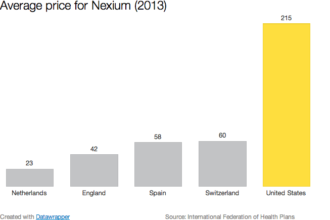The healthcare industry is enormous. People spent over $4.5 trillion on healthcare in 2022 alone.
Healthcare is undergoing a significant transformation, driven by technological advancements, changes in policy, and evolving patient expectations. We covered some of them in our post on breaking healthcare trends. From more personalized care to enhanced efficiency, here are five key ways healthcare is changing today.
1. Personalized Medicine is on the Rise
Gone are the days of one-size-fits-all treatment plans. Personalized medicine, also known as precision medicine, uses an individual’s genetic makeup, lifestyle, and environment to tailor healthcare strategies specifically for them. Thanks to advancements in genomics and biotechnology, healthcare providers can now predict how different patients will respond to certain treatments, making healthcare more effective and less intrusive.
For example, cancer treatments are now often customized based on genetic profiling, which can identify which therapies will work best for a particular tumor type. This shift is not only enhancing outcomes but also reducing the likelihood of adverse effects, as patients receive treatments better suited to their specific needs.
2. Medicare Advantage Plans are Becoming More Comprehensive
Medicare Advantage (MA) plans have seen substantial growth in recent years, and with it, an expansion in the variety of benefits they offer. Unlike traditional Medicare, MA plans often include additional services like dental, vision, and hearing care. They may also offer wellness programs, telehealth options, and prescription drug coverage. Check out these Medicare Advantage Plans 2025
MA plans also emphasize preventative care, offering annual wellness visits and screenings that help detect health issues early, before they become serious. As these plans continue to evolve, beneficiaries are seeing an increase in options, providing more comprehensive, patient-centered healthcare experiences at lower out-of-pocket costs.
3. Telemedicine is Becoming the Norm
Telemedicine has been around for years, but the COVID-19 pandemic rapidly accelerated its adoption. Today, remote healthcare services are widely available and are expected to remain a central part of the healthcare ecosystem. Telemedicine allows patients to consult with doctors via video or phone, which reduces the need for travel and increases access to care for individuals in rural areas or those with mobility challenges.
This trend is also saving patients time and making healthcare more accessible, especially for follow-up visits, routine checkups, and mental health services. In the future, we can expect telemedicine to be further integrated into primary care and specialist services, giving patients more options for how and where they receive medical advice and treatment.
4. Wearable Health Technology is Expanding
Wearable health devices like smartwatches, fitness trackers, and even smart rings are transforming the way individuals monitor their health. These devices can track everything from heart rate and sleep patterns to blood oxygen levels and stress. More advanced models are even able to detect irregular heartbeats, which can alert users to potential cardiovascular issues.
In 2024, wearables are becoming a key part of preventative healthcare. Physicians can access real-time data from these devices to better manage chronic conditions like diabetes and hypertension. As wearables continue to evolve, they are likely to become more sophisticated, further enhancing personal health monitoring and early detection of health issues.
5. AI-Powered Interactive Avatars for Medical Use
One of the most exciting innovations in healthcare is the use of AI-powered interactive avatars. These digital avatars, which mimic human interactions, are being used for patient engagement, virtual consultations, and even mental health therapy.
Imagine a patient interacting with a digital version of their doctor or healthcare provider, asking questions, receiving advice, and even getting basic diagnostic information. These avatars use natural language processing and machine learning algorithms to understand and respond to patients’ needs. They can simulate empathetic conversations, making patients feel more at ease, particularly in mental health settings or for those who are hesitant to seek in-person care.
These AI avatars are still in their early stages, but as the technology improves, they could play a major role in helping manage chronic conditions, providing health education, and supporting overburdened healthcare professionals.
The healthcare landscape is evolving quickly, driven by technological advancements, patient needs, and policy changes. From the rise of personalized medicine and comprehensive Medicare Advantage plans to the growth of telemedicine and AI-powered avatars, these changes promise to improve healthcare accessibility, efficiency, and outcomes for everyone. As these trends continue, patients and providers alike will benefit from a system that’s more responsive, personalized, and effective.







